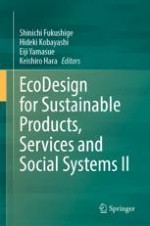2024 | OriginalPaper | Buchkapitel
22. Food Loss and Waste: Mixed Analysis from the Circular Food Economy
verfasst von : Sinndy Dayana Rico Lugo, Koji Kimita, Nariaki Nishino
Erschienen in: EcoDesign for Sustainable Products, Services and Social Systems II
Verlag: Springer Nature Singapore
Aktivieren Sie unsere intelligente Suche, um passende Fachinhalte oder Patente zu finden.
Wählen Sie Textabschnitte aus um mit Künstlicher Intelligenz passenden Patente zu finden. powered by
Markieren Sie Textabschnitte, um KI-gestützt weitere passende Inhalte zu finden. powered by
